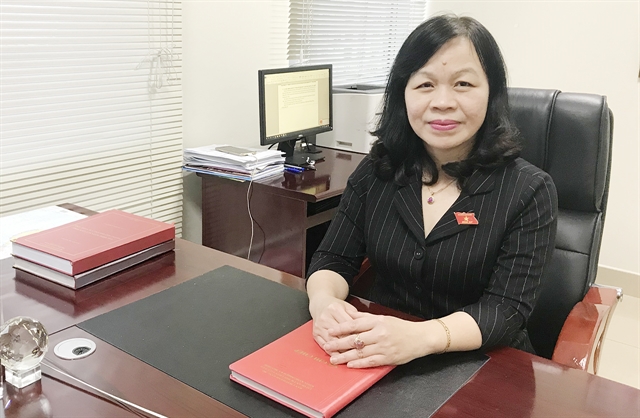 Politics & Law
Politics & Law

Nguyễn Thị Mai Hoa, permanent member of the National Assembly (NA)'s Committee for Culture, Education, Youth, Adolescents and Children, NA deputy of Đồng Tháp Province, talks to the NA portal about the upcoming election.

|
| Nguyễn Thị Mai Hoa. — Photo quochoi.vn |
Nguyễn Thị Mai Hoa, permanent member of the National Assembly (NA)'s Committee for Culture, Education, Youth, Adolescents and Children, NA deputy of Đồng Tháp Province, talks to the NA portal about the upcoming election.
In the 14th National Assembly term, there were 38 per cent female candidates, but only 26.7 per cent of them won a seat. So with the figure of 45.28 per cent this term, will there be a higher number of women elected?
This is good news, a very good signal because we have properly implemented the provisions of the Law on Election of NA Deputies and People's Councils, ensuring at least 35 per cent of women on the list of candidates.
The National Strategy on Gender Equality for the period 2011-20 set a target of at least 35 per cent of deputies to the NA and people's councils to be women in the 2011-16 term elections. However, in the term of the 14th NA, the proportion of women accounted for only 26.7 per cent of the total number of NA deputies. Even at lower levels, female participation rate is quite far from the target. Although these rates have increased compared to the previous term, the target of Resolution 11 of the Politburo and the National Strategy on Gender Equality, it still has a large gap.
With 45.28 per cent of female candidates running for the 15th NA, we can believe that the proportion of women in the 15th NA will definitely be higher. To achieve this however depends on many factors.
The quality of female candidates needs to be high and meet the requirements of the voters.
In the structure of constituencies, the candidates' chances of winning must also be high. And in the future when the female candidates run their campaigns, they must be trusted by the voters.
As a pioneer, you recently participated in exchanging experiences and skills with female elected candidates. Through the training, what are the difficulties and pressures they face, especially first-time candidates?
When participating in the skill enhancement seminars for female candidates, I sympathised because I have experienced their moods myself. From my personal experience, I also shared with them about the pressure they will face.
First of all, when participating in the election, one must be aware of the role of the NA as the highest body of state power. The NA deputies represent the people, speak their voice and protect the interests of the people. It is an important responsibility and also a very big challenge that worries candidates.
Second is the pressure from voter expectations of the delegates. The activities of the 14th NA show that the quality of the NA's members has improved, contributing to the successes of the NA. Therefore, if becoming a member of the 15th NA, the responsibility of the delegates is not only to keep the results of the previous sessions, but also to make great achievements according to the new requirements.
There are other pressures. In particular, there is pressure on gender roles when women take on both office work and housework. Time management will be a challenge and women must surpass themselves. Because society still has concerns about women, such as lack of confidence or limited understanding, and limited relationships, whether women can surpass themselves to become members of the NA or not, that is a great challenge for women.
In the coming meetings with voters, what should female candidates pay attention to build an effective action programme and build a good image and trust with voters?
The action programme is the commitment and promise of female candidates to voters when they are elected. So investing in an action programme is one of the requirements posed for female candidates. In order to have a good action programme, candidates must first gather and collect a system of necessary documents and information about the location they will be standing for, voters’ wishes and interests and in particular they must study to understand the NA, especially, the elements and qualities NA deputies need and which functions should be performed.
It is also important that female candidates understand what their strengths are. There may be many issues voters are interested in, but they should only choose those that are right for the functions and duties of deputies of the NA and suitable for their own advantages to contribute the most.
In the proposed action plan, they should not make too many promises, not to commit to solving big problems, but to mention the things that they can do and do well. Voters do not want delegates to promise much and do little.
Image building is also a very necessary factor for female candidates. They can use their qualities and abilities, along with their appearance. Because voters often interact with candidates, in addition to hearing their plans of action, voters also see their image. — VNS




